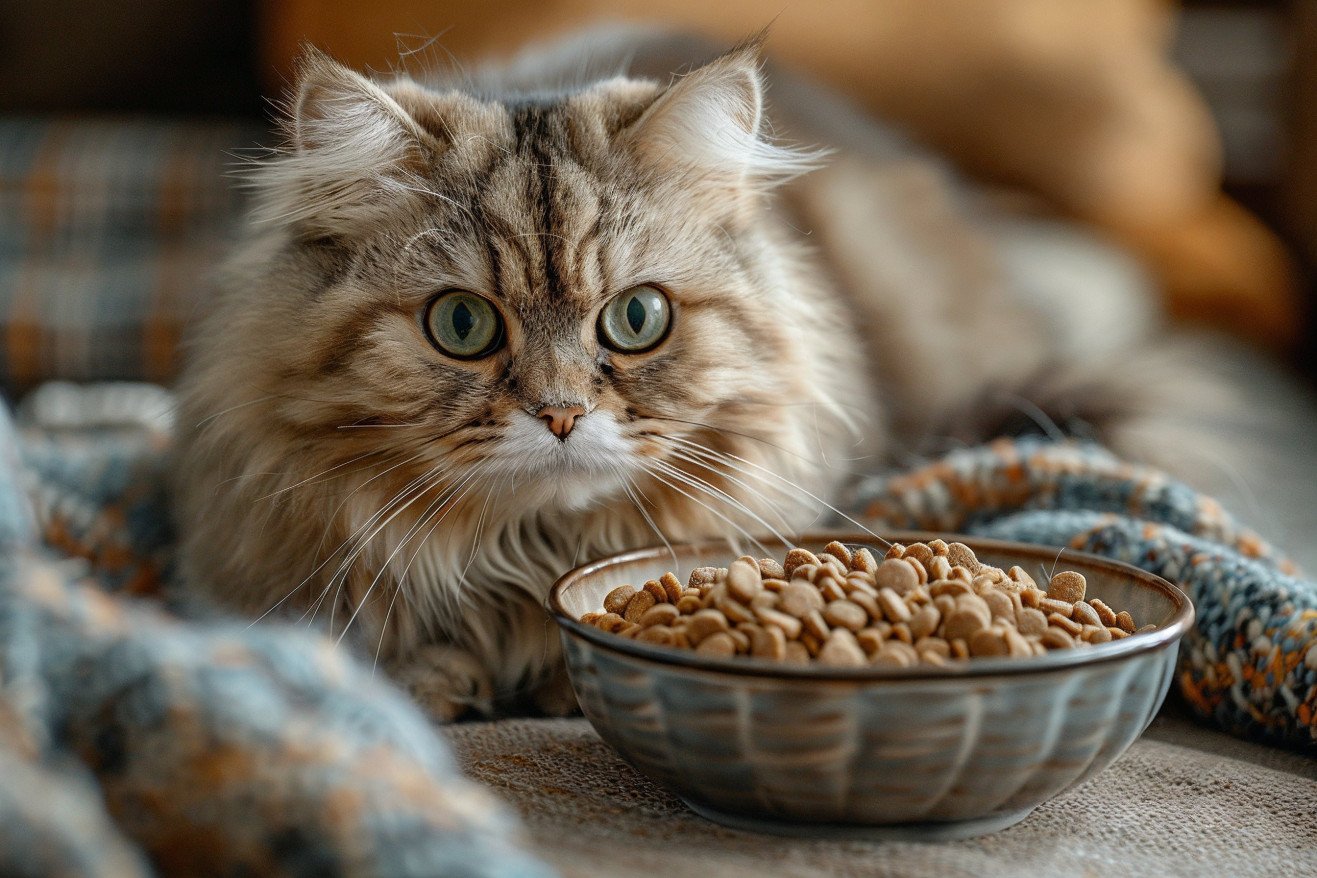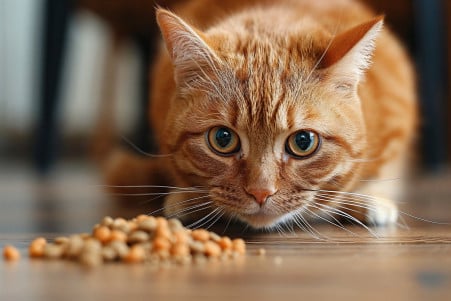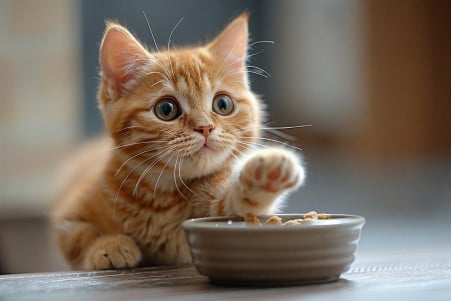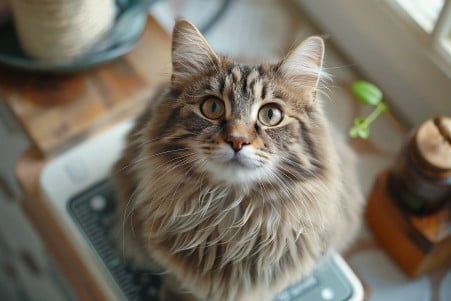Why Won't My Cat Eat but Is Acting Normal? Exploring Cat's Appetite Loss
24 April 2024 • Updated 24 April 2024

While it can be alarming when your cat won't eat, especially if they aren't showing any other signs of illness, there are many reasons why a cat might go off their food for a day or two. Stress, changes in routine or environment, and even changing their diet can all cause minor disruptions in your cat's eating habits. If your cat is still active, drinking water, and otherwise acting normal, there's probably no need to worry if this goes on for a day or two.
To help you figure out what might be going on with your cat, we referenced veterinarians to find out the most common reasons a cat won't eat but is otherwise acting normal. We also looked to animal behavior research to find out more about cat behavior and any potential health concerns you should be aware of, as well as how you can help your cat eat. Armed with this information, you can decide whether or not your cat needs to see a vet or if there are some things you can do at home to help them start eating again.
Why is my cat not eating much but acting normal?
Other Reasons for Loss of Appetite in Cats
Stress and anxiety are common reasons for cats to experience a short-term loss of appetite, and it's often brought on by a change in routine, environment, or household dynamics like the introduction of a new pet or baby. Dental problems like gum disease, tooth decay, or mouth pain can cause discomfort and lead to a decrease in appetite, especially when it comes to dry food. Gastrointestinal issues like nausea, vomiting, or bloating due to bacterial infections or inflammation can also cause a cat to stop eating.
Some medications or vaccines can cause side effects that will cause a cat to eat less, including nausea or an upset stomach. As cats get older and become seniors, their sense of taste and smell can decrease, which can impact their appetite even if they're feeling well. While any of these issues could be causing a cat to eat less, the good news is that there are often simple solutions that can help them get back to their regular eating habits.
How to Stimulate a Cat's Appetite
If your cat is not eating, there are a few things you can do to stimulate their appetite. According to the Kingsdale Animal Hospital, one of the best things you can do is to offer a variety of different foods, textures, and flavors. In addition, you can try warming up wet food or adding toppings like broth or cheese to make the food more appealing.
In addition, you can try to create a more comfortable, stress-free eating environment for your cat. This may involve experimenting with different types of bowls and locations. Daily Paws also recommends using food puzzles or dispensing toys to make mealtime more exciting and stimulating for your cat. This can help satisfy their natural hunting instincts.
If you are unable to stimulate your cat's appetite naturally, Preventive Vet suggests talking to your vet about prescription appetite stimulants. These may include drugs like mirtazapine or capromorelin, which can help stimulate your cat's appetite by affecting their brain's hunger hormones. That said, it's important to remember that you should only give your cat medications that have been prescribed by a vet.
When to Take Your Cat to the Vet for Not Eating
If your cat has not eaten for more than 24-36 hours, you should take them to the vet, according to T&C Vets. Prolonged inappetence, especially in overweight cats, can cause liver failure and other health problems. WebMD also notes that unexplained weight loss in cats is a sign of an underlying health condition, including diabetes, gastrointestinal issues, and organ failure.
Other symptoms such as vomiting, diarrhea, weight loss, or lethargy can be signs of an underlying medical condition, according to Tumwater Vet. Cats with yellowing of the eyes or gums need to be seen by a vet immediately, as this can be a sign of liver disease, according to Rancho Village Veterinary Hospital. It's important to get a diagnosis and treatment as soon as possible because, according to PetMD, a cat not eating can become life-threatening very quickly.
Potential Medical Causes of Anorexia
Dental disease, mouth pain, or oral infections can make eating painful and lead to a loss of appetite. Gastrointestinal problems such as inflammatory bowel disease, pancreatitis, or intestinal blockages can cause nausea and a lack of appetite. Kidney disease, liver disease, and other organ failures can cause a loss of appetite and systemic illness.
Certain cancers or tumors can cause a loss of appetite and weight loss. Infections, viruses, or other systemic illnesses can cause a loss of appetite as a symptom. It's important to seek medical care to diagnose and treat the underlying cause of anorexia in cats as soon as possible, as a lack of appetite can quickly become life-threatening.
How to Avoid and Treat Feline Inappetence
To avoid stress-related changes in appetite, Purina suggests that cat owners create a regular feeding schedule and environment for their pets. It's also important to slowly introduce new foods and diets to prevent sudden food aversions. Frederick Cat Vet also advises that cat owners keep a close eye on their pets' eating and weight to catch any changes or issues as soon as possible.
International Cat Care also recommends that cat owners create a comfortable, quiet feeding area for their pets that is separate from their litter box and any other high-traffic areas. PetMD suggests that cat owners use puzzle feeders and food-dispensing toys to keep their pets' minds active and engaged during mealtime, which can help keep them interested in eating.
Conclusion: Keep an Eye on Your Cat's Eating Habits
It's important to monitor your cat's eating habits closely, as temporary decreases in appetite are common and not usually a cause for concern if your cat is otherwise healthy and active. However, if the loss of appetite continues or is accompanied by other symptoms, it's important to see your vet as soon as possible.
Loss of appetite can lead to life-threatening complications in cats, so it's important not to wait to seek help. By understanding the potential causes and trying various strategies to stimulate your cat's appetite, you can help ensure that your cat eats a healthy, balanced diet and avoids serious health problems.


